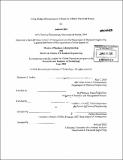Using design of experiments to improve a batch chemical process
Author(s)
Hill, Andrew, S.M. (Andrew James). Massachusetts Institute of Technology
DownloadFull printable version (8.666Mb)
Other Contributors
Leaders for Global Operations Program.
Advisor
Roy Welsch and Charles L. Cooney.
Terms of use
Metadata
Show full item recordAbstract
Novartis Vaccines and Diagnostics has made a strong commitment to manufacturing seasonal influenza vaccines through their cell culture technology called Optaflu®. The goal of this project is to improve overall process yield by modifying the upstream process. The focus is on using a batch process to generate a high-density cell culture and then infecting said culture. This thesis presents the approach of using a Design of Experiment series to change a manufacturing process. Current vaccine production occurs with a fed-batch process by feeding glucose as a carbon-energy source for the final cell expansion step. This cell culture is diluted, infected, harvested, and purified for use in an influenza vaccine. Primarily, the project aims to increase cell density, using a batch process, at the infection step which should improve overall process yield. The project can therefore be broken into two main steps: batch cell growth and highdensity infection. Experiments for this project were conducted with a small-scale laboratory process that mimics the production process. The planned approach was a Design of Experiment series to screen parameters and partially optimize the cell growth process, a scale-up cell growth experiment, and finally another Design of Experiment series to explore high-density cell infection. While initial small-scale experiments showed extremely positive results, the results were not consistent and could not be replicated at a larger scale. A number of exploratory experiments were run to attempt to identify which factors inhibit high-density cell growth, particularly around scale-up, but no key parameter was identified. Given the process improvement and cost savings implications from the success of the initial small-scale experiments, this project is worth further exploration.
Description
Thesis (M.B.A.)--Massachusetts Institute of Technology, Sloan School of Management; and, (S.M.)--Massachusetts Institute of Technology, Dept. of Chemical Engineering; in conjunction with the Leaders for Global Operations Program at MIT, 2010. Cataloged from PDF version of thesis. Includes bibliographical references (p. 70-71).
Date issued
2010Department
Leaders for Global Operations Program at MIT; Massachusetts Institute of Technology. Department of Chemical Engineering; Sloan School of ManagementPublisher
Massachusetts Institute of Technology
Keywords
Sloan School of Management., Chemical Engineering., Leaders for Global Operations Program.